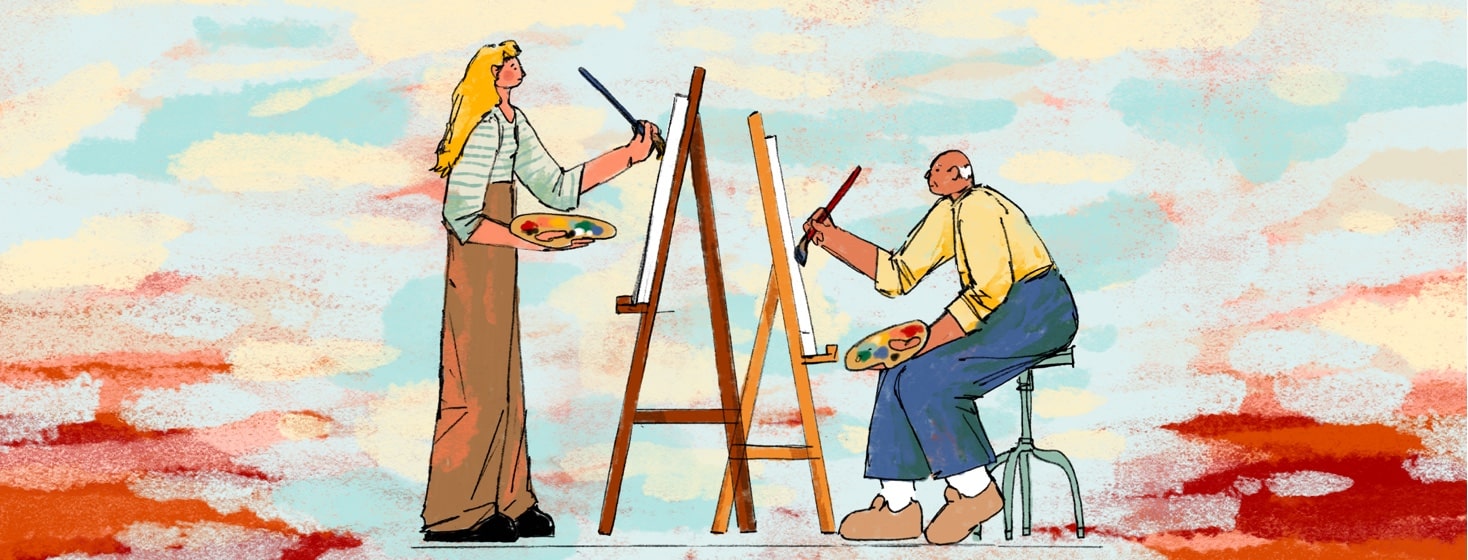What Are Some Creative Outlets for Coping With Frustration?
Besides being a writer, I’m an artist. I paint and illustrate, though not nearly as often as I should. Sometimes, I feel like I have to be in the right headspace for it.
On second thought, maybe it’s the “wrong” headspace I need to be in. When I’m aggravated, frustrated, stressed, or overwhelmed... When I feel like crying at the drop of a hat... When I feel helpless and like the world is spinning out of control... That’s when the magic can really happen. That’s when I can take my brushes to my sketchbook or a canvas, and creativity flows without me having to really think about it. That’s when I paint fast and loose with no concern for keeping things in the lines. That’s when I produce my best work.
Coping with a hard day
I recently had one of those days. I threw caution to the proverbial wind, and let the paint fly. I knocked out two paintings in a matter of minutes. I felt a whole lot better almost immediately. I shed some of the weight that was pressing down on my shoulders with those broad strokes.
Then, this morning I had this thought. “What if I didn’t have that? What if I didn’t have some sort of outlet? What if all of that turmoil, whether real or created in my head, had to stay inside?” As it is, I have a lot of options. I can take a walk. I can read. I can paint. I can take care of our farm animals or do yard work. I can write. I can call a friend. I can even scream at the top of my lungs if I want to. There is nothing or no one stopping me.
When activities & hobbies are stripped away
Grandmommie and Daddy didn’t have those tools in their arsenals in the end. They didn’t have many options. Dementia robbed Grandmommie of her voice almost entirely, and mixed up all of the letter and word combinations that Daddy had floating around in his brain. The frustration must have been maddening.
Even though they may have been stripped of their armour and swords, the battles inside of them ensued. I can’t help but feel like they had no defense against them. I can’t imagine how frustrating it must be to want to say something that you can’t say or somehow express what you want to get out. They also didn’t have the wherewithal or ability to go take a jog or scream out loud without their efforts of release being somehow quashed.
How to get rid of pent up frustration
Pent up frustration isn’t good for anyone, be them a caregiver or someone being cared for. It’s in everyone’s best interest to find ways to let off some steam for both parties involved.
When Daddy had a brief stay with my aunt, he found a lot of contentment there. She helped this by keeping his hands busy. They painted together and worked on his handwriting. Even just sitting on the front porch seemed to help him decompress a bit.
Just keep in mind that no one wants to be mad or upset. No one stomps around with their arms crossed and brows furrowed because it’s fun. It’s a physical manifestation of what’s going on inside. A distraction, an activity, some space, offering a creative outlet... No matter how small, all of these things can go so far in helping an agitated mental state. Patience and understanding can also go a long way. We’ve all been in a position where we felt misunderstood or not heard. Imagine how hard it would be to live there full-time.
What can you do as an Alzheimer's caregiver?
So, what can you do when you’re dealing with a frustrated person with Alzheimer’s or dementia?
Exhibit an abundance of patience and understanding. Give them ways to express themselves. Draw, paint, or color in coloring books. Have them take photos. Sing with them or play music. Dance. Play games. Laugh.
Let them pick their own clothes, even if they don’t match. Play a grown-up version of dress-up complete with sunglasses, hats, and feather boas. Mimic funny faces back and forth. Let them be silly. Give them a respite from “best behavior” for the sake of some kind of freedom of expression. Take breaks from seriousness. Give them the chance to have fun. Smiles tend to chase away the notion of tantrums.
What creative outlets have you found most beneficial for your loved one living with Alzheimer's disease? Share your story below.

Join the conversation